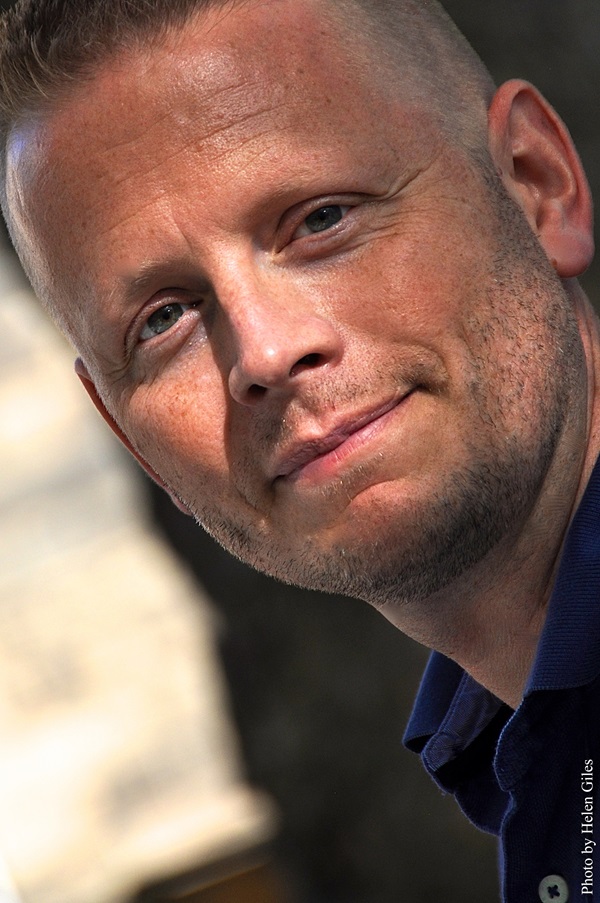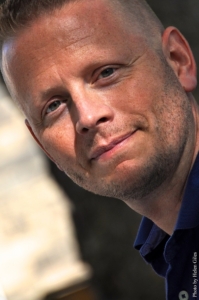
Chronicles of a Lizard Nobody: an interview with Patrick Ness
Patrick Ness is on the shortlist for this year’s Nero Children’s Book Award with his daring and unpredictable comic fantasy Chronicles of a Lizard Nobody. Clive Barnes interviewed Patrick about the book for Books for Keeps.
 When I talk to Patrick Ness about Chronicles of a Lizard Nobody, we begin with the sheer laugh-aloud unpredictable craziness of the tale. It’s a school story about Zeke, a monitor lizard, his two monitor lizard friends, Daniel and Alicia, and their animal schoolmates and teachers. There’s Principal Wombat, who, in the nature of wombats, has an armoured butt (the school and its vernacular are recognisably Stateside) and a pelican bully called Pelicarnassus. It’s the tale of an absurdly escalating confrontation between pelican and lizard which reaches an apocalyptic climax when Helicarnassus puts on an outsize robot suit and sets about destroying not only Zeke and his friends but the whole school. I should mention, too, that Zeke shelters the country of France on his knee, whose defection from accustomed geography has left the Iberian Peninsula as a lonely island in the Atlantic Ocean.
When I talk to Patrick Ness about Chronicles of a Lizard Nobody, we begin with the sheer laugh-aloud unpredictable craziness of the tale. It’s a school story about Zeke, a monitor lizard, his two monitor lizard friends, Daniel and Alicia, and their animal schoolmates and teachers. There’s Principal Wombat, who, in the nature of wombats, has an armoured butt (the school and its vernacular are recognisably Stateside) and a pelican bully called Pelicarnassus. It’s the tale of an absurdly escalating confrontation between pelican and lizard which reaches an apocalyptic climax when Helicarnassus puts on an outsize robot suit and sets about destroying not only Zeke and his friends but the whole school. I should mention, too, that Zeke shelters the country of France on his knee, whose defection from accustomed geography has left the Iberian Peninsula as a lonely island in the Atlantic Ocean.
‘So, where did all this come from?’ I ask Patrick. Well, the book begins with Zeke wondering if he has been made school hall monitor because he is a monitor lizard, and that’s where Patrick himself started. ‘It was a pun, just a stupid pun. It just snuck up on me. These sweet little characters appeared and I thought, well, there you go, it needs to be written. Walker were not expecting a middle-grade book from me but off they went and published it.’ He found writing a middle grade-book a challenge. ‘Middle grade is tough but it made me pay attention, made me bring my A game.’ Talking about the madcap mayhem of the book, he says ‘I really believe that you follow an idea where it wants to go and you let the idea be your guide.’ And about France, ‘I have a writing philosophy that there is no such thing as realism. Even if it looks like our world, it is still a fantasy. And all anyone needs to do in any book is make a universe where that story can logically take place.’
So, partly, France (and maybe the whole book?) is an exercise in seeing how far this idea can be stretched. Patrick remembers his own reading at this age and the work of American writer and illustrator Daniel Pinkwater (‘completely wild’) and how he was astonished and excited by how far fiction could push the boundaries of the possible. ‘I loved that kind of rule breaking. It just blew my mind. I thought, let’s take up the torch for the six, seven, eight-year-old reader who I was and let’s see if I can blow someone else’s mind. That’s really what it was.’
But, as Patrick continues to talk about France, another aspect of the book comes into view. ‘Children have burdens that they shouldn’t have, that they handle so bravely and uncomplainingly. I find it so moving and it’s popped up in my books more than once.’ Zeke may be embarrassed by France, ‘It’s how kids feel about most burdens. They don’t want to draw attention to them. He shouldn’t have to deal with France but that he does so and that he does it so well is heartbreaking and beautiful to me.’
Having a European country resting on his knee is by no means Zeke’s greatest burden. As we gradually learn, Zeke’s father has died and his mother has sunk into a deep depression. Any reader of Patrick’s previous books will recognise this theme of a child or young person under pressure. ‘I think that’s a really common situation,’ Patrick continues, ‘and I think it’s still somewhat under addressed particularly for children younger than teenagers. A bright kid will figure the situation out. But they will figure it out with about 80-85% accuracy, and they will fill the other 15% that remains with wrong, and possibly really damaging, stuff. That can be a situation both tragic and comic. This book is really about Zeke figuring out his friends, figuring himself out a little bit more, figuring out his mom a little bit more, realising that he doesn’t have to carry the whole burden himself and getting rid of a little bit of that 15% that’s causing him pain. That shows up in a lot of my work and it’s the most aching part of growing up.’
There is more to our conversation: incidentally, what Patrick owes to Winston Churchill, the publication of a second Lizard book to look  forward to next year, and especially Patrick’s joy and surprise at finding himself on an award shortlist for a middle-grade book. But, to my mind, in the first part of our interview, we have touched on what is essential and remarkable about the book, and why it deserves to be on that shortlist. It’s thrilling, funny and touching, a daring and unpredictable comic fantasy, grounded by perceptive observation of the absurdities of school life and with a deep feeling for both the pressures of childhood and the real compensations of friendship and adult concern and support. How this is all brought together seamlessly and with such love is a real achievement.
forward to next year, and especially Patrick’s joy and surprise at finding himself on an award shortlist for a middle-grade book. But, to my mind, in the first part of our interview, we have touched on what is essential and remarkable about the book, and why it deserves to be on that shortlist. It’s thrilling, funny and touching, a daring and unpredictable comic fantasy, grounded by perceptive observation of the absurdities of school life and with a deep feeling for both the pressures of childhood and the real compensations of friendship and adult concern and support. How this is all brought together seamlessly and with such love is a real achievement.
Clive Barnes was Principal Children’s Librarian, Southampton City and is now a researcher and writer on children’s books.
Chronicles of a Lizard Nobody by Patrick Ness, illustrated by Tim Miller, is published by Walker Books, £7.99 pbk.





